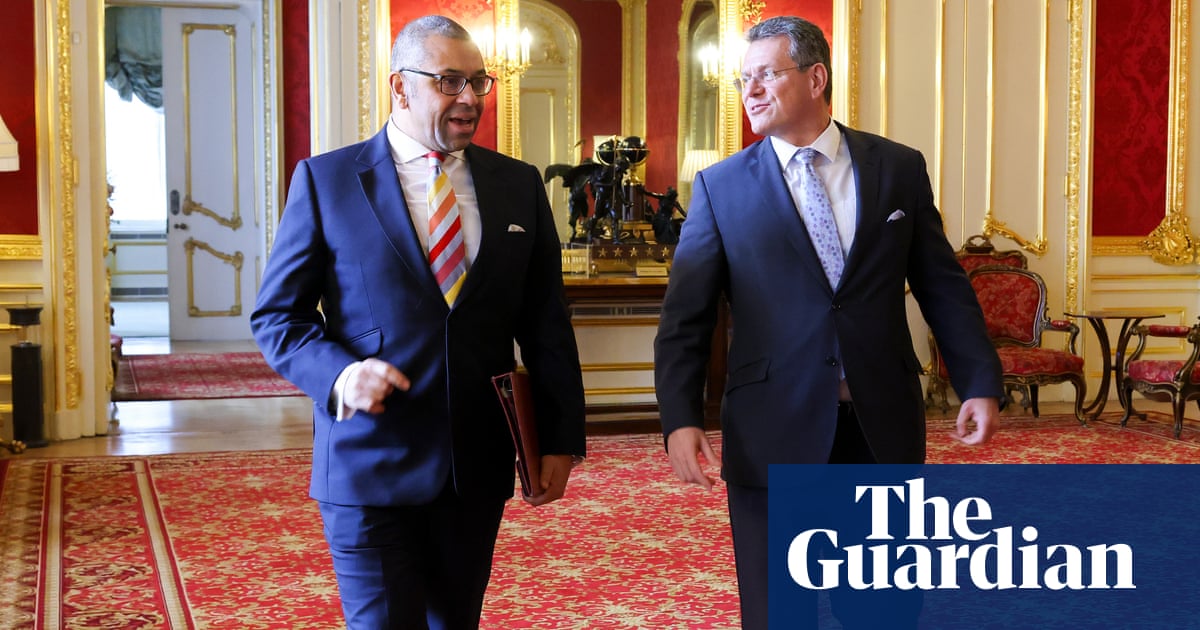
Downing Street has refused to restart Brexit deal negotiations despite Michael Gove performing a U-turn at the dispatch box in which he praised a “constructive move” by the EU minutes after declaring the talks “effectively ended”.
The EU’s chief negotiator, Michel Barnier, seemingly agreed to all the government’s demands for the resumption of Brexit talks in pursuit of a deal – sending a tweet just as Gove was making a statement in the Commons castigating the bloc.
A No 10 spokesman said the prime minister had noted the EU’s offer to “intensify” the talks during a call between Barnier and his British counterpart on Monday but insisted there remained no basis yet to resume the negotiation.
The spokesman said: “This was a constructive discussion. The UK has noted the EU’s proposal to genuinely intensify talks, which is what would be expected at this stage in a negotiation. However, the UK continues to believe there is no basis to resume talks unless there is a fundamental change of approach from the EU.
“This means an EU approach consistent with trying to find an agreement between sovereign equals and with acceptance that movement needs to come from the EU side as well as the UK. The two teams agreed to remain in close touch.”
The knockback means the Brexit standoff continues, with just four weeks left in which worthwhile negotiations may be conducted in pursuit of a comprehensive trade deal before the parliamentary ratification process will need to begin.
Speaking in the Commons, Gove had initially welcomed the offer by Barnier. The EU negotiator who spoke to his British counterpart, David Frost, a few hours earlier, tweeted: “I just spoke to David Frost. As stated by [the European commission president] Ursula von der Leyen on Friday, I confirmed that the EU remains available to intensify talks in London this week, on all subjects, and based on legal texts. We now wait for the UK’s reaction.”
Barnier’s statement appeared to meet all the requests No 10 had been making as the price of new talks.
Gove told MPs: “Even while I have been at the dispatch box it has been reported that there has been a constructive move on the part of the EU and I welcome that … obviously we need to work on the basis of the proposed intensification they propose. And I prefer to look forward in optimism than look back in anger.”
In response to a further question in the chamber, the chancellor of the duchy of Lancaster added: “If there has been movement, and it seems there as been today, then no one would welcome it more than me.”
The government’s final response once Gove had left the chamber caused some bemusement in Brussels. Both the German chancellor, Angela Merkel, and the French president, Emmanuel Macron, had said on Friday that they were willing to compromise on the most contentious issues of domestic subsidy control and EU access to British fishing waters.
EU sources suggested that Downing Street simply felt unable to reverse Johnson’s suspension of the talks so quickly.
Moments before admitting that the outlook was looking newly positive, Gove had claimed a litany of failures of the EU to engage in good faith with the UK, in a statement to the Commons.
He claimed the “EU was only willing to conduct negotiations on fewer than half the days available” for a deal; that it would “not engage on all of the outstanding issues” and “refused to discuss legal texts”. The final insult was its deletion of the chance of an “intensification” of talks in a statement by the council of EU leaders last Thursday, it was claimed.
In short, he said, the EU had “refused to negotiate seriously for [the] last month or so”, leading to Johnson’s decision to end talks last Friday unless the EU came back with “fundamental challenges”.
He said the preparations for no deal were “now intensifying”, with reports that he has instructed the special “exit operation” committee to meet five times a week as of Monday.
The blunt assessment came hours after a “constructive” meeting of Gove and the European commission vice-president, Maroš Šefčovič, at the joint committee charged with implementing January’s withdrawal agreement.
It was out of tune with a lengthy statement by Šefčovič an hour following his meeting with Gove.
Šefčovič welcomed the clear political steer and commitment given by Gove outlining progress on key areas.
He said that “today’s meeting demonstrated the political will to move at pace on both sides”, but warned that “despite some progress, much work remains to be done by the UK” in relation to the Northern Ireland protocol.
One EU insider described the progress at the joint committee meeting as “a turning point”, coming just weeks after the UK threatened to blow up the process with the UK internal market bill’s powers to “disapply” the withdrawal agreement.
At the meeting the two sides agreed a number of issues including access to EU databases and IT systems for the UK to implement the protocol.
The Irish broadcaster RTÉ also reported that the EU had asked to have 15 border officials present in Northern Ireland in place of a permanent office in Belfast to ensure the EU rules are maintained in relation to customs and veterinary checks.












